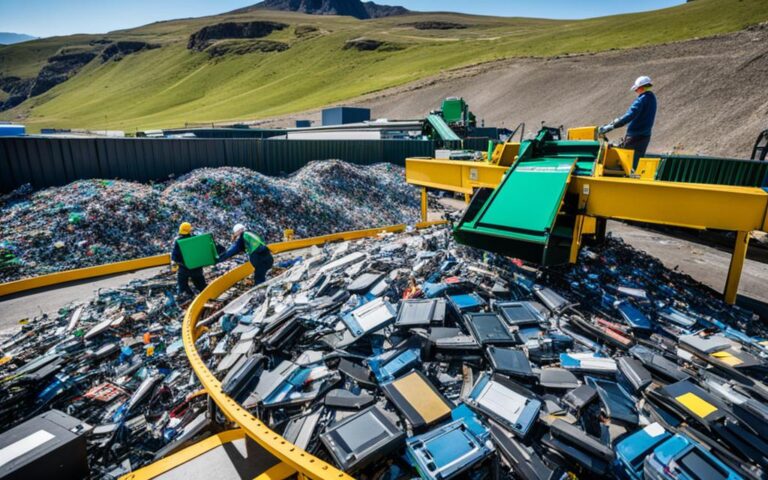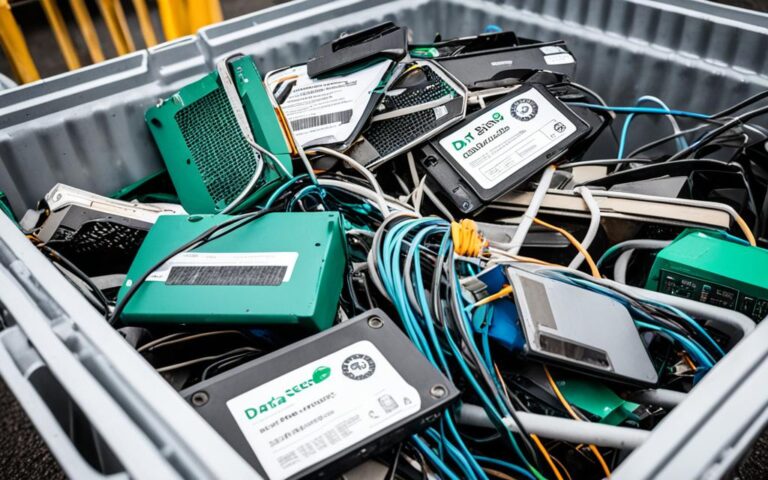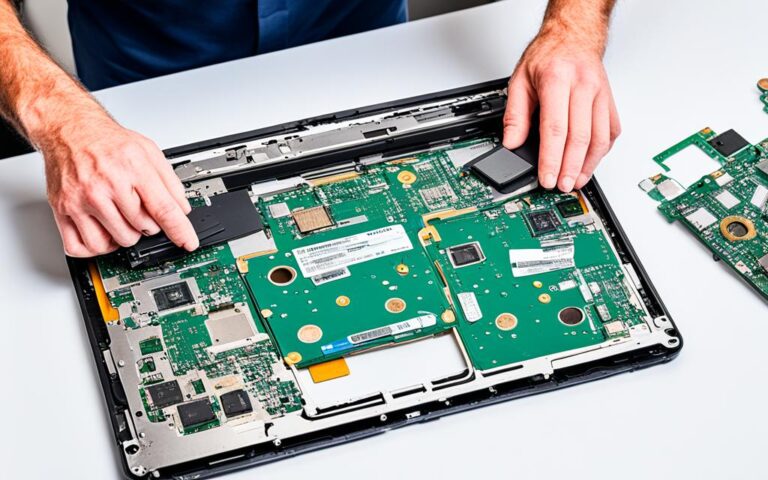Corporate Responsibility: Implementing Laptop Recycling in the Workplace
In today’s world, it is crucial for businesses to prioritize sustainability and environmental stewardship. One area where companies can make a significant impact is through corporate laptop recycling. By implementing a laptop recycling policy in the workplace, businesses can actively contribute to workplace sustainability while demonstrating their commitment to corporate responsibility.
Laptop recycling is not only a responsible choice but also a strategic one. It allows businesses to reduce their environmental impact by diverting electronic waste from landfills. Instead, these laptops can be recycled, reducing the consumption of raw materials and energy required to produce new devices.
Implementing a laptop recycling policy also ensures compliance with data protection regulations. By securely disposing of old laptops, businesses can mitigate the risk of data breaches and maintain the confidentiality of sensitive information.
Furthermore, embracing laptop recycling in the workplace enhances a company’s reputation. Customers and stakeholders are increasingly interested in supporting businesses that prioritize environmental sustainability. By implementing a laptop recycling policy, businesses can showcase their commitment to responsible practices, improving their brand reputation and attracting environmentally conscious customers.
Lastly, implementing a laptop recycling policy can lead to cost reduction. Properly disposing of laptops through recycling programs eliminates the need for expensive waste disposal fees. Additionally, businesses can avoid potential fines for non-compliance with environmental regulations.
To learn more about the benefits of implementing a laptop recycling policy, continue reading section 2 below.
The Benefits of Implementing a Laptop Recycling Policy
Implementing a laptop recycling policy in the workplace provides numerous benefits for businesses. Not only does it contribute to environmental sustainability, but it also helps ensure compliance with data protection regulations, enhances the business’s reputation, and reduces costs.
Ensuring Data Security and Compliance
A secure recycling policy for laptops is essential in today’s digital age. By implementing proper recycling practices, businesses can minimize the risk of data breaches and avoid costly fines. Compliance with data protection regulations, such as the General Data Protection Regulation (GDPR), is crucial for safeguarding sensitive information and maintaining customer trust.
Improving Business Reputation
Implementing a laptop recycling policy demonstrates a commitment to sustainability and environmental stewardship. This proactive approach resonates with customers who value businesses that prioritize corporate social responsibility. By prioritizing the secure disposal and recycling of laptops, businesses can enhance their reputation and attract environmentally conscious customers.
Reducing Costs
A laptop recycling policy can lead to cost reduction for businesses. By properly disposing of laptops and other electronic waste, businesses can reduce waste disposal fees and avoid potential fines for non-compliance with waste management regulations. Additionally, recycling materials from laptops can generate revenue through resale or recycling programs.
Implementing a secure laptop recycling policy not only helps protect sensitive data but also improves business reputation and reduces costs.
In summary, implementing a laptop recycling policy in the workplace offers numerous benefits, ranging from secure data disposal to improved business reputation and cost reduction. By prioritizing proper recycling practices, businesses can contribute to a more sustainable future while reaping the rewards of compliance and cost savings.
How to Create an Effective Laptop Recycling Policy
Creating an effective laptop recycling policy doesn’t have to be complicated. By following a few key steps, businesses can establish a sustainable and secure approach to laptop recycling.
Step 1: Waste Audit
A waste audit is an essential first step in creating a successful laptop recycling policy. It involves assessing the current waste management practices of the workplace to identify opportunities for secure recycling. Through a waste audit, businesses can determine the volume of electronic waste generated, assess the effectiveness of existing disposal methods, and pinpoint areas for improvement.
Step 2: Employee Education
Employee education is crucial in ensuring proper document disposal and recycling. Conduct training sessions to raise awareness about the importance of responsible e-waste management and the specific procedures for laptop recycling. Emphasize the importance of securely disposing of confidential documents, highlighting the potential data security risks associated with inadequate disposal practices.
“Proper education and training ensures that all employees understand their role in the laptop recycling process, promoting a culture of sustainability and responsible waste management in the workplace.”
Step 3: Secure Disposal
To ensure secure disposal of confidential documents and sensitive data, it’s essential to partner with a reputable recycling company. Companies like Shred-it specialize in secure document destruction and recycling, providing businesses with peace of mind that their electronic waste is handled in compliance with data protection regulations.
Step 4: Recycling Bins
Make recycling bins easily accessible throughout the workplace to encourage employees to properly dispose of their laptops and other electronic devices. Ensure that the bins are clearly labeled and distinguished from general waste bins. Providing separate bins for different types of e-waste, such as laptops, mobile phones, and batteries, can further enhance recycling efforts.
Step 5: Monitoring Progress
Regularly monitor and evaluate the progress of the laptop recycling policy to measure its effectiveness and identify areas for improvement. Keep track of the volume of recycled laptops and other electronic devices, as well as the cost savings achieved through recycling efforts. Use this data to communicate the positive impact of the policy to employees and stakeholders, encouraging continued engagement and participation.
The Role of Recycling in Waste Reduction and Responsible Consumption
Waste reduction and recycling initiatives play a crucial role in promoting environmental sustainability and responsible consumption in the workplace. By implementing effective strategies, businesses can make a positive impact on the environment and contribute to a greener future.
Conducting a Waste Audit
One of the first steps in waste reduction is conducting a waste audit. This assessment helps businesses identify areas where waste can be minimized and resources can be conserved. By understanding the types and quantities of waste generated, companies can develop targeted strategies to reduce their environmental footprint.
Employee Engagement
Employee engagement is vital for the success of waste reduction initiatives. By involving employees in the process and promoting awareness, businesses can foster a culture of sustainability. Encouraging employees to actively participate in recycling programs and waste reduction efforts can significantly improve overall results.
“Employee engagement is essential for achieving meaningful waste reduction in the workplace. By involving employees in the process and providing education on the importance of responsible consumption, we can create a more sustainable future.”
Reducing Single-Use Plastics
Single-use plastics are a significant contributor to environmental pollution. By reducing the use of disposable plastic items such as bottles, cups, and cutlery, businesses can minimize waste and promote responsible consumption. Encouraging the use of reusable alternatives and providing recycling bins for plastic waste can make a significant difference.
Implementing Recycling Programs
Implementing comprehensive recycling programs is key to waste reduction efforts. Setting up designated recycling bins for different types of materials, such as paper, plastic, and glass, ensures that recyclable waste is properly sorted and processed. Partnering with local recycling facilities or waste management companies can further enhance recycling initiatives in the workplace.
Composting Food Waste
Composting food waste is an effective strategy to divert organic waste from landfills. By providing compost bins in common areas, businesses can encourage employees to dispose of food scraps in an environmentally friendly manner. The resulting compost can then be used in landscaping or community gardens, promoting sustainable practices beyond the workplace.
Eco-Friendly Products and Digital Solutions
Choosing eco-friendly products and embracing digital solutions can also contribute to waste reduction efforts. By opting for products made from sustainable materials and reducing paper consumption through digitalization, businesses can minimize their environmental impact. Transitioning to digital workflows and utilizing cloud-based storage can reduce the need for physical storage and paper documentation.
By incorporating these waste reduction strategies, businesses can actively promote responsible consumption, minimize their environmental impact, and inspire positive change in their employees and communities.
Vape Recycling as a Corporate Social Responsibility Initiative
Vape recycling plays a crucial role in corporate social responsibility (CSR) efforts, aligning with environmental sustainability principles and promoting a positive impact on the environment. By implementing vape recycling initiatives, businesses can demonstrate their commitment to reducing electronic waste, conserving resources, and preventing pollution.
Engaging in vape recycling initiatives allows businesses to actively contribute to community well-being by addressing environmental concerns. By partnering with local communities, businesses can create a positive community impact through their recycling efforts.
Furthermore, embracing vape recycling initiatives enhances brand reputation. It signals to stakeholders, including customers and investors, that the company is actively engaging in sustainable practices and taking responsibility for its environmental impact.
Regulatory compliance is another essential aspect of corporate social responsibility. By implementing vape recycling programs, businesses ensure compliance with environmental regulations and contribute to a cleaner, healthier environment.
To summarize, vape recycling offers numerous benefits as a corporate social responsibility initiative, including environmental impact reduction, stakeholder engagement, community impact, enhanced brand reputation, and regulatory compliance.
The Significance of Vape Recycling in Corporate Social Responsibility
Vape recycling plays a critical role in corporate social responsibility by demonstrating a company’s commitment to minimizing its ecological footprint and engaging with stakeholders. Not only does it contribute to the reduction of waste, but it also conserves valuable resources and prevents pollution, making a positive environmental impact.
One of the key effects of vape recycling is its impact on community well-being. By addressing environmental concerns and ensuring public health and safety, vape recycling programs contribute to creating a healthier and more sustainable community.
Furthermore, vape recycling also holds importance in enhancing brand reputation. When businesses actively participate in sustainability initiatives like vape recycling, they showcase their dedication to corporate social responsibility, building trust and loyalty among stakeholders. This not only attracts environmentally conscious customers but also improves overall brand perception.
Regulatory compliance is another significant aspect of vape recycling. By adhering to the laws and regulations related to e-waste disposal, companies demonstrate ethical conduct and ensure that their practices align with governmental standards. This not only helps protect the environment but also mitigates potential legal risks.
Overall, vape recycling is an essential component of corporate social responsibility, encompassing environmental impact reduction, stakeholder engagement, community well-being, brand reputation enhancement, and regulatory compliance. By embracing vape recycling initiatives, businesses can make a meaningful contribution to the environment, society, and their own sustainable growth.
The Environmental Benefits of Vape Recycling
Vape recycling programs are highly effective in reducing electronic waste, conserving resources, and preventing pollution. By properly disposing of vape devices, batteries, and e-liquids, businesses can help minimize the negative ecological impact of these products.
The Community Impact of Vape Recycling
Vape recycling programs address environmental concerns, ensuring a cleaner and healthier community. By responsibly managing e-waste, businesses contribute to waste reduction efforts, protect natural habitats, and support sustainable development.
Enhancing Brand Reputation Through Vape Recycling
Participating in vape recycling initiatives demonstrates a company’s commitment to sustainability and environmental stewardship. This proactive approach to corporate social responsibility helps build a positive brand reputation, attracting environmentally conscious customers and fostering brand loyalty.
Regulatory Compliance in Vape Recycling
Vape recycling ensures compliance with e-waste disposal regulations, safeguarding businesses from legal consequences. By adhering to these regulations, companies exhibit responsible environmental practices and maintain the trust of regulatory authorities.
| Benefits of Vape Recycling | Environmental Impact | Stakeholder Engagement | Community Impact | Brand Reputation | Regulatory Compliance |
|---|---|---|---|---|---|
| Reduces electronic waste | ✓ | ✓ | ✓ | ✓ | |
| Conserves resources | ✓ | ✓ | ✓ | ||
| Prevents pollution | ✓ | ✓ | ✓ | ||
| Addresses environmental concerns | ✓ | ✓ | |||
| Ensures public health and safety | ✓ | ||||
| Enhances brand reputation | ✓ | ||||
| Ensures regulatory compliance | ✓ | ✓ |
Conclusion
Implementing a laptop recycling policy in the workplace is crucial for businesses committed to corporate responsibility and sustainability. By properly disposing of old laptops and electronic devices, companies can make a positive impact on the environment and demonstrate their commitment to environmental stewardship.
In addition to sustainability benefits, laptop recycling also ensures compliance with data protection regulations. By securely recycling electronic devices, businesses can reduce the risk of data breaches and potential fines. This proactive approach to compliance showcases a commitment to protecting sensitive information and maintaining customer trust.
Furthermore, implementing a laptop recycling policy can have a positive impact on brand reputation. Customers are increasingly conscious of a company’s environmental practices and are more likely to support businesses that prioritize sustainability. By actively recycling laptops and other electronic devices, companies can enhance their brand reputation and attract environmentally conscious customers.
Finally, laptop recycling also presents cost-saving opportunities. By properly disposing of electronic waste, businesses can avoid costly waste disposal fees and potential fines for non-compliance. Moreover, embracing waste reduction and recycling practices can lead to more efficient resource utilization, resulting in long-term cost savings for the organization.
FAQ
Why is implementing a laptop recycling policy in the workplace important?
Implementing a laptop recycling policy in the workplace is crucial for businesses that want to operate sustainably and demonstrate corporate responsibility. It helps reduce environmental impact, ensure compliance with data protection regulations, improve reputation, and reduce costs.
What are the benefits of implementing a laptop recycling policy?
Implementing a laptop recycling policy ensures compliance with data protection regulations, reducing the risk of data breaches and fines. It also improves the business’s reputation by showing customers a commitment to sustainability and environmental stewardship. Additionally, recycling can help reduce costs by reducing waste disposal fees and the risk of fines for non-compliance.
How can I create an effective laptop recycling policy?
Creating an effective laptop recycling policy starts with conducting a waste audit to identify opportunities for secure recycling. Employee education is crucial to ensure proper document disposal and recycling. Partnering with a recycling company like Shred-it can ensure secure disposal of confidential documents. It’s important to make recycling bins accessible and clearly label them. Monitoring progress and communicating changes or updates to the policy can help improve recycling efforts.
How does recycling contribute to waste reduction and responsible consumption?
Waste reduction and recycling initiatives in workplaces contribute to environmental sustainability and responsible consumption. Conducting a waste audit helps identify areas for improvement. Employee engagement is essential for the success of waste reduction initiatives. Reducing single-use plastics, implementing recycling programs, and composting food waste are effective strategies. Choosing eco-friendly products and embracing digital solutions also contribute to waste reduction efforts.
Why is vape recycling important for corporate social responsibility?
Vape recycling is a significant aspect of corporate social responsibility as it aligns with environmental sustainability principles. It reduces electronic waste, conserves resources, and prevents pollution. Embracing vape recycling initiatives allows businesses to engage with stakeholders, contribute to community well-being, enhance brand reputation, and ensure regulatory compliance.
What impact does vape recycling have on corporate social responsibility?
Vape recycling demonstrates a company’s commitment to minimize its ecological footprint and engage with stakeholders. It has a positive impact on the environment by reducing waste, conserving resources, and preventing pollution. Vape recycling programs contribute to community well-being by addressing environmental concerns and ensuring public health and safety. Enhancing brand reputation and ensuring regulatory compliance are additional benefits of vape recycling.
Why is implementing a laptop recycling policy vital for corporate responsibility and sustainability?
Implementing a laptop recycling policy in the workplace is vital for corporate responsibility and sustainability efforts. It benefits businesses by ensuring compliance, improving brand reputation, reducing costs, and demonstrating environmental stewardship. By following best practices in waste reduction, recycling, and responsible consumption, companies can make a positive impact on the environment, engage stakeholders, and contribute to a greener future.















